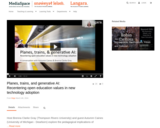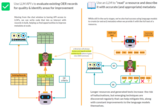
Host Brenna Clarke Gray (Thompson Rivers University) and guest Autumm Caines (University of Michigan - Dearborn) explore the pedagogical implications of generative AI in this conversation in honour of Open Education Week. They ask such questions as:
- What happens when we leap into new technologies without first pausing to imagine harms, such as surveillance, bias, and discrimination?
- Can recentering the core values of the open education movement—equity, inclusion, transparency, and social justice—in our pedagogy help us move forward in a good way?
- How do we introduce these considerations to our students and empower them to make informed decisions with new technologies?
- Subject:
- Applied Science
- Computer Science
- Education
- Information Science
- Material Type:
- Lecture
- Author:
- Brenna Clarke Gray
- Autumm Caines
- Date Added:
- 03/05/2024


